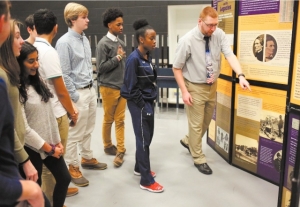A learning parallel
By Phyllis Moore
Published in News on January 24, 2018 5:50 AM

News-Argus/CASEY MOZINGO
Teacher Joe Cook talks to a group of students at Wayne Country Day School about the traveling exhibit "Emancipation and Its Legacies" on loan from Gilder Lehrman Institute of New York.
Current events have taken Joseph Cook's U.S. history and civics classes at Wayne Country Day School to a whole different level.
So when the school was recently chosen as the site for a display on slavery, emancipation and civil rights, it sparked even more interest in the discussions.
"Emancipation and Its Legacies," four interlocking panels featuring historical documents and research, was developed by the Gilder Lehrman Institute of American History in partnership with the National Underground Railroad Freedom Center. It will be on display at the school through Feb. 14.
Cook, in his fourth year at the school, said the timing fit neatly into the curriculum for his high schoolers.
He didn't even have to change the course of his lesson plans since the topics are keenly relevant for students.
"We're on the end of the Civil War and into Reconstruction, and in geography, we have covered the controversy of the Civil War and monuments, so it ties in with that," he said Tuesday. "I wish it wasn't so relevant, to put it mildly."
This year, his classes have been talking about such subjects as immigration and the Haitian revolution, with slavery and oppression also finding their way into the conversations.
"Some of them (students) have a lot of questions," Cook said. "Certainly seniors are required to follow current events."
The plan is for the Upper School, those in grades 7-12, to have an opportunity to see the traveling display, but Cook says he would also like the younger students to visit.
But it is also open to the community, he added.
"If the general public wants to come, any day, Tuesday through Thursday at 3 p.m., I have an introduction video," he said. "They can come to my room, Room 304 and then go to see the display."
Several supplemental efforts are also being made to coincide with the project -- including a special speaker on Jan. 29 at the school for WCDS families and area high school students. Dr. Peter Carmichael of Gettysburg Collage will lead a discussion on the Civil War.
Cook said he is also planning two movie nights for students.
"We plan to show 'Glory' and 'Selma' and then discuss how they portrayed the events as opposed to how they accurately happened," he said.
A free and open to the public viewing of "Glory" will be shown on Feb. 12 and either "Selma" or "Lincoln" will be show at the school Feb. 19 at 3 p.m.
Relevant topics are just one technique he uses in class to spark debate among his students.
During a visit with his U.S. history class of juniors on Tuesday, several students shared their thoughts on current events.
"From what (Cook) said about people fighting like Martin Luther King, with him fighting for black rights, I think it's similar to what's going on today with women's rights and marches and stuff," said Beverly Tabe, who is also president of the school's Diversity Club. "I think history's very important. You need to learn about the past so that you try not to make the mistakes here in the present."
Classmate Jacob Bauer called the subject matter "monumental" not just for this country but others that may not have the same level of equality as the U.S.
"There are countries, such as both in the Middle East and the African continent, they can look to the U.S. as an example in order to reach a level of equality with the U.S. that's so hard to achieve and is still working to improve," he said.
Hanna McKeithan drew a parallel between slavery and current-day human trafficking.
"People are still sold, not the same type of slavery," she pointed out. "It's hard looking back and realizing that we haven't learned our lesson."
The students said their social consciousness has become heightened through the current climate as well as opportunities to talk openly about them in school.
"I think freedom of speech is very important and people should be able to use that because back then (in history), people were very limited and they were, I guess you could say, scared to say what they wanted and now that we have social media and other things, to be able to say what we want and just hopefully cause change," Tabe said.
One of the historical figures being studied in class, Frederick Douglass -- an African-American social reformer and abolitionist who escaped from slavery in Maryland -- would have loved social media, said Cook, evoking laughter from his class.
"His advice to students late in his life, they asked him what they should do with their lives and his advice was, 'Agitate. Agitate. Agitate. Agitate,'" Cook said.
McKeithan said she is actually excited about what her generation and those to follow might do to improve the world.
"Bash, what's your research paper about," Cook asked of student Bash Attiah.
"Should I mention it?" Attiah responded, before volunteering the subject of the project due in March -- "Trump's inability to understand past events or history."
"In general, (it's about) the importance of leaders understanding the facts," Cook explained.
Attiah agreed he has certainly had plenty of material to draw upon to substantiate his research, before responding to why he chose that as his topic.
"Other than it's kind of humorous," he said, "I'm kind of interested in seeing how our current president now looks back at history and doesn't have, like, the ability to comprehend what we're going through right now or what has happened in the past and seeing all his speeches and all his interviews and looking back on what he said and how he said everything.
"It's just interesting seeing how he's our president."
